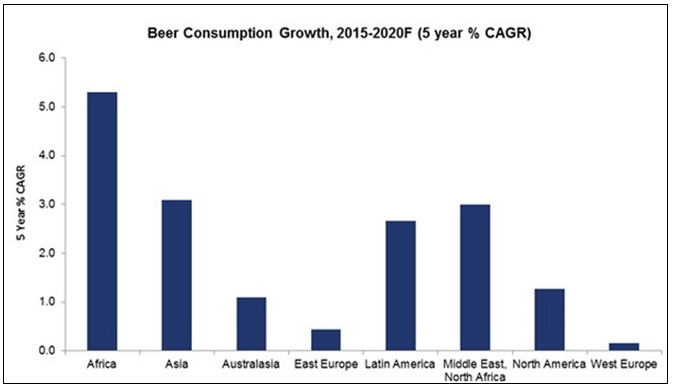The Competition Commission believes it is on track to meet the extended deadline (until 5 April 2016) for the completion of its inquiry into AB-InBev’s proposed acquisition of SABMiller, South African media reported on 22 March 2016.
They may not like this. AB-InBev’s takeover of SABMiller could well take up to 18 months to be cleared as South African unions gear up to fight deal, The Wall Street Journal speculated on 25 February 2016.
Officially at least, AB-InBev’s takeover of SABMiller is all about breaking into the African market, where SABMiller is the dominant player. But Africa’s days of buoyant economic growth seem to be over, for the time being. “Low oil prices in oil-producing countries are affecting us very obviously, like in Nigeria,” Heineken’s CEO Jean-François van Boxmeer told CNBC Europe’s "Squawk Box" on 10 February 2016.
AB-InBev is moving swiftly towards its merger with SABMiller. Two days after selling USD 46 billion in bonds to fund the SABMiller deal, on 15 January 2016 the Belgian company completed a secondary listing in South Africa.
The case could not have come at a worse time for SABMiller as it seeks to get local approval for its sale to AB-InBev. Amalgamated Beverage Industries (ABI), the soft drink division of SABMiller’s local unit SAB, is being sued by 150 of its former employees, who say they were exploited under the guise of “black economic empowerment” policies.
It is common wisdom that “two’s company and three’s a crowd”, meaning that with three parties and different agendas the complexity of the problems increases. This could have been one of the reasons why the world’s number one drinks company said on 28 July 2015 that it is dissolving a joint venture with Namibia Breweries (NamBrew) and Heineken in South Africa and neighbouring Namibia three years earlier than planned so Diageo can now go it alone in those countries.
Forensic auditors have uncovered financial malfeasance at Carlsberg’s brewery in Malawi, amounting to nearly DKK 80 million (USD 12 million), it was reported. This has led to the suspension of three local employees, suspected of defrauding the company.
Funny that no one asked the question why Diageo should want to invest in sorghum beer in South Africa? Until recently, few Diageo watchers would have thought that premium spirits brands and a cheap traditional beer go together well. Besides, South Africa’s beer behemoth SAB exited the category 15 years ago, probably thinking that there was not much in it for them.
KHS GmbH, one of the leading manufacturers of filling and packaging systems for the beverage, food and non-food industries worldwide, is intensifying its customer service in Africa through a cooperation with the international Portuguese AMAL Group.
News-wise, it was not a good month for SABMiller. In February 2015 the world’s number two brewer had to report the departure of two top executives. The first to resign was MillerCoors’ CEO Tom Long, following the announcement of a 12 percent fall in MillerCoors’ fourth quarter underlying net income. MillerCoors, the number two brewer in the U.S., is a joint venture between SABMiller and Molson Coors. Mr Long, 56, intends to retire on 30 June 2015. He has served as CEO since 2011.




